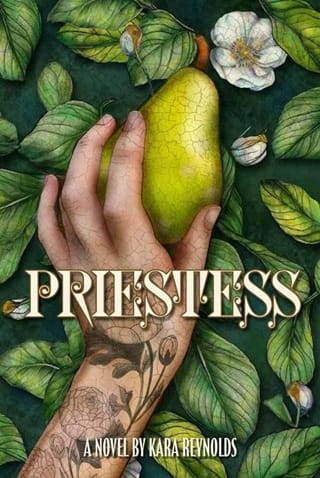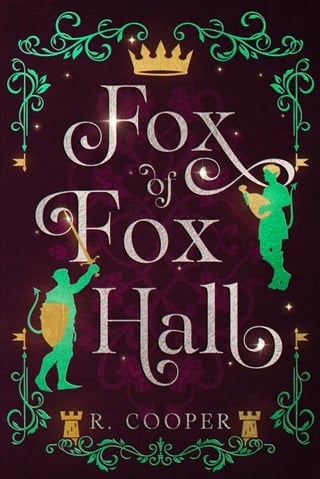2. Sanctuary
Looking back now, I realize I had been lost in thought, both particularly on that day and in that winter.
Otherwise, I would have actually read the translations and copies Mischa and I had done of crumbling trade arrangements and concerned ambassadors’ missives.
I would have noticed that Helena and Maureen, both talented illustrators, had been more often drafted into updating and copying maps than illuminating manuscripts.
And on that day, I would have heard the shouts in the street, the clatter of hooves on stone and the distant clash of steel on steel.
And I would have heard the slamming shut of a thousand doors because every soul alive on this continent knows that an invading Tintarian will only kill those found outside their own homes.
But I had sat there, fretting.
The priest, having likely taken a nap in his office, had been woken by a laundress delivering fresh linens to the chapel.
As there was nothing worth stealing in Agnes chapels, he left and left the doors open for me to continue my ‘contemplation of our saint’s good sense.’ I sat there, trying to remember the last time I cried and if this was worth crying over.
And I missed an entire invasion.
The shout of my name coupled with the sounds of a city in distress came through the flung-open doors.
I turned in my pew and saw my three scribe friends standing in the archway, outlined by the red of a setting sun.
My first thought was that it was late in the day.
My second was that something was wrong because people were yelling outside.
“Edie, where have you been?”
said Mischa, hurtling up the aisle to me.
Helena and Maureen were on her heels, asking the same.
“I’m sorry I didn’t get bread,”
I sighed, looking over their shoulders at the now closed doors.
“What’s going on?”
“Tintar invades,”
cried Mischa.
“I told you, didn’t I? I told you all those letters from ambassadors said Eccleston broke trade agreements with Tintar.
I told you they would come for us! Tintarians are savages! They worship godforsaken trees and mountains! They eat raw fish and think nothing of killing anyone in their way.
They are animals and they will kill us all.
They are ruthless.
And then there’s their king.”
“The Shark King,”
I murmured.
“And the dragons,”
added Maureen.
“Aren’t they said to have dragons?”
Helena held her daughter’s hand tightly and nodded to me.
“Mischa is right.
We have stopped selling them our metals.
Some of the mines are trading to any country but Tintar and some are dealing exclusively with Perpatane buyers, because they now pay in gold, not just silver.
Tintar is a proud country and they, essentially, have a right to see that as an act of war.”
“Essentially?”
snapped Mischa.
“Essentially, my man says they will slaughter us within an hour of breaching the city wall.”
“These walls are not built for sieges,”
said Maureen.
Helena shook her head.
“We can only claim sanctuary indoors.”
“What?”
I said, bleary and suddenly, ridiculously, hungry.
It was well past the hour of the last meal of the day.
“The sanctuary doctrine of Tintar,”
Mischa said, frustrated, seemingly hurt by my delayed understanding of her earlier concern for me.
“Oh,”
I said, stupidly.
“Oh, yes,”
I said, more focused.
“Oh, my gods, they are invading, aren’t they? Eccleston is being invaded.”
“Yes!”
the three of them said, Maureen, desperate, Helena, in a begging manner and Mischa, now furious.
“Do we have time to make it back to our homes?” I asked.
Helena shook her head.
“I saw men in the Tintarian black through the scriptorium window.
They were not far away.”
I had never seen the black armor of Tintarian armies, only heard or read about it in historical accounts of battle and desolation.
I swallowed.
“Well, we can certainly claim sanctuary in a chapel of Agnes.”
“They only invade buildings of government and of monarchies,”
Mischa said.
“So we’re safe?”
Maureen asked.
Helena shrugged and Mischa looked at the floor before answering, “I think.
Tintarians are wildly religious but not Rodwin religious.
They worship nature and the elements and their temples are sacred to them.
Complete pagans.
So, we might be alright.”
The doors flung open a second time and the four of us jumped.
Five figures stood in the opening for a moment and this second time, the doors’ opening allowed in the specific sounds of war.
For a beat, I believe we four saw five Tintarians and began to panic, but it was only five other women, one of whom, bolted the doors closed behind them.
“Sanctuary?”
asked Helena.
A bent woman with white hair nodded as she walked closer to us, the others following her.
“We are too damn far from my house to make it.
This is my daughter, Eefa,”
she said, pulling a thin straw-haired girl towards her.
She put her hand on her chest.
“I’m Bronwyn.
We own a hatchery.
We were on our way back from our delivery route.
There’s no way we could make it in time before those bastards cut us down.”
I noticed the large woven baskets on their arms.
“Mother,”
said Eefa, momentarily embarrassed by her gregarious parent, which struck me as equally ridiculous as my pangs of hunger.
A beauty only a few winters older than Maureen, introduced herself as Catrin.
Her hair was the color of fall leaves, a color I had always envied and wished my chestnut brown was more like.
Again, I felt silly for noticing this whilst actual battle happened outside the white walls of Agnes.
My mind was delayed.
It was like hearing something shouted from across a large room.
The two remaining women seemed to be much more intelligent than I was being and one of them, tall and reedy with a bit of a heavy jaw, said, “With what can we barricade the doors?”
“Nothing,”
said Mischa.
“All the pews are stone and the podium is a part of the tile it sits on.
They’re carved from the same rock.”
“Get the chair from the priest’s office!”
I said, absurdly gleeful I had finally said something useful.
The tall woman walked past me in a whirl of serge skirts, her companion on her heels.
They dragged the simple wooden chair out from the small office and propped it against the inside of the two doors, under the rickety bolt.
All nine of us looked at our pathetic champion of a defense.
“Oh, we’re dead,”
wailed Eefa, the girl with the straw-colored hair.
“No!”
said Mischa and she explained the sanctuary doctrine of Tintar.
“She is right!”
exclaimed the tall woman’s companion, a friendly-faced woman with a long nose, small mouth and wide-set eyes.
“I am a tutor of history! And cultures! I help boys study for their university entrance exams! Mostly Ecclestonian history, but I know some other countries’ and she’s right! Tintarians only kill in the streets when they invade.”
She blinked in her excitement and looked like she was ready to tell secrets and buy the next pitcher of ale, not explain foreign cultures.
“I’m Quinn,”
said the tall woman.
“This is River.
We’re sisters.
We both work as private tutors and she is, as is your friend, correct.
Tintarians only invade government holdings.
Not private ones.
And not temples.”
I looked from the square-jawed Quinn to River’s dainty, almost feline features.
I did not believe they were sisters.
“Why are we saying our names?”
erupted Eefa.
“We’re about to be kill—”
“Hold on,”
I said, raising my hands.
I then remembered I was the head scribe of a university scriptorium and had been for some time.
I had managed the distribution of tasks, the petty squabbles and jealousies amongst staff, often some of the duties of the master scribe, all while smiling.
Nineteen women had answered to me.
The position should have gone to someone with more experience.
I was merely passable as a translator and my illumination skills, while adequate, were nothing compared to Helena and Maureen.
I was best at fine penmanship and organization.
But I excelled at navigating personalities and smoothing over emotional wrinkles.
And that is why the university had asked me to be head.
“Hold on,”
I repeated.
“We must remain calm.
We are safe.
Let’s stay quiet and not alert them to our presence.
Agnes chapels are small.
The doorway is smaller than most on this street.
They may pass us by.”
Outside the screaming had escalated.
“I agree,”
said the beautiful Catrin, nodding.
“I purposely ran to an Agnes chapel.
I’m also too far from my home. I’m—”
her breath caught in her throat and she swallowed.
“I don’t even live in Eccleston.
My family is… My uncle is Raymond Tigon.”
“You’re a Tigon?”
asked Bronwyn.
Catrin’s mouth wobbled.
“I’m here to have my wedding gown made.”
There was a moment of muted sympathy.
I truly felt for her, the child of a wealthy mining bloodline, away from their estate, in town for a precious reason, only to coincide with black-armored Tintarians.
“So, it is agreed,”
Helena said, my staunch supporter, so used to seconding my decisions as head scribe.
“We will remain quiet and wait out the invasion.”
A moment of agreement among us passed before the pitiful wooden doors, their bolt and the office door shuddered with a sound reminiscent of a thunderclap.
“The gods have damned us,”
whispered Mischa.
A second booming hit the doors.
They had found us and they were using some kind of a battering ram.
Eefa started to cry, Bronwyn clutching her daughter in her arms.
Maureen and Helena clung to each other, as did Quinn and River.
“Get in the priest’s office,”
I said in a low voice, as a third boom sounded.
They all looked at me and then, like children, fell into line as I pointed at the space behind the podium and then walked them inside, gently closing the small door behind us.
The assaults on the door continued and seemed to increase in volume.
“We can only hide in here so long,”
Quinn said to me, not unhelpfully, but concerned.
There we were, nine women in a closet of an office, huddling.
And then it occurred to me, we were well and truly damned.
The Tintarian sanctuary doctrine applied only to private holdings, nothing supported by taxes.
Government buildings or buildings owned by a monarchy were not safe.
I closed my eyes.
A small tax on Ecclestonians paid the priests’ salaries and provided the relationship between businesses and those in need of work.
Tintar would see Saint Agnes as an extension of The Council of Ten.
My eyes darted around the room.
I was trying not to panic when I saw it, the basket of linens delivered earlier by the laundress, piles of white cloth.
I lifted the basket onto the priest's small desk, sheafs of paper falling to the floor.
From the top of the basket, I held up a voluminous garment.
“What are you doing?”
said Mischa.
“How religious would you say the Tintarians are? About their temples and their clerics and gods?”
I asked River.
“Very,”
she said, over the sound of their battering ram.
The doors would splinter in minutes.
“Put these on,”
I ordered, tossing the first garment to Maureen.
“What?”
cried Mischa.
“They’re robes,”
I explained, now pulling them out of the basket with speed, praying there were nine of them.
There were ten.
I huffed out a breath of relief, pulling one over my head.
Another strange thought occurred to me.
I was about to die and a few hours ago, the worst thing I thought could happen would be seeing my estranged husband.
I was about to die and I had been annoyed that the baker’s stall was closed.
I was about to die and just days ago Mischa and I had shared a pipe and sat at a window in her house, talking.
“What are we doing?”
Eefa asked.
“Just do it,”
said Mischa, “Edie’s no fool.
Just do it.”
I felt a warmth for my mouthy friend.
I heard men’s voices outside.
They were shouting and it was coming through more clearly as the doors must have been breaking.
We all flailed in the white fabrics.
Once I had mine on, I turned back to River, my hands fishing under my white robe for my scribe’s apron.
“Am I correct in thinking Tintar is a very symbolic culture? They like their sigils and amulets?”
She bobbed her head, her feline face paling above the already white robe.
I withdrew an old manuscript reed pen from the apron pocket.
It felt full in my hand.
“Let’s give ourselves some symbols then.”
I took Maureen’s face in my hand.
“I am sorry, the nib may scratch.”
I gave her three wide blue streaks across her right cheek.
The flow of the nib was broad and meant for heavier lettering.
As I moved to Helena and then Mischa, the doors gave a deafening crack.
“Hurry,”
I said reaching for the other women, sketching the same streaks on them.
Eefa and Catrin were crying openly.
A final, doomed thwack sounded as the doors broke and flew open, shards hitting the inner walls of the chapel.
There was a silence and then a steady voice’s command.
“You have been breached.
Come out of the room and meet your deaths with dignity.”
 Fullepub
Fullepub 



